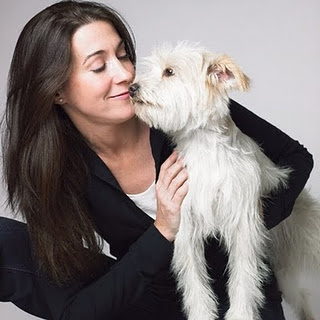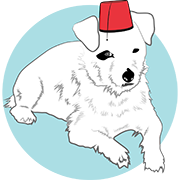
Kelly Dunbar had a terrific conversation with Andrea Arden on Animal Cafe this week but before I get to the substance, I need to get a little gush — and one small whine — out of the way. I’ve seen Andrea on various Animal Planet shows and I’m a huge fan. I was trying to figure out what I like so much about her TV persona, and when I was looking for images to put on this post I figured it out: Dogs are always kissing her!
You never see dogs kissing Cesar Milan, of course, and — I could be wrong — but I don’t recall Victoria Stilwell getting bussed by any pups. A trainer who has no problem with overt signs of affection, who emphasizes the joy rather than the obedience aspect of the human-dog interaction, is my kind of TV role model.
The whine? I loved Andrea’s turn in from Underdog to Wonderdog, which showed that any dog could be a star with time and attention (and okay, a team of trainers, groomers, vets and dog house architects). I know it’s a fantasy, but I’ll take it over ones like, say, Kim Kardashian’s wedding. I wish Animal Planet would resurrect the show.
It would be remiss of me not to mention here that Andrea also has a thriving dog training business, and is the author of several training books, including the recent Barron’s Dog Training Bible. So she actually is a dog trainer; she doesn’t just play one on TV.
Great Expectations
One of the biggest problems Andrea encounters as a trainer is people suffering from the Lassie Syndrome: expecting a dog to walk into their household and not only know exactly how to behave but also to perform supercanine feats. This sets a dog up to fail.
Dogs are selfish, just as we are. They are programmed to guard resources, to grab food — to survive. We have to teach them that food is not in limited supply, that they needn’t be concerned when something is removed, that they need to have impulse control.
It’s not unreasonable to expect dogs to behave in a way that’s compatible with our lifestyle, but we have to teach them our ways.
We also have to respect their ways. “Many people consider their dogs to be members of their family,” Andrea says, “but don’t acknowledge that they have different needs and personalities. Some people get annoyed when their dog is not equally friendly to all other dogs, for example, but why would you assume your dog should like every creature in the street?”
What you can realistically expect a dog to learn
Among realistic expectations for your dog:
— To be house trained
— Not to nip or bite in play
— To give people friendly greetings
— To come back when called
Andrea says that the biggest complaint people have about their pets is with regard to house training; they complain that a four-month-old puppy is being willful and deliberately disobedient when she piddles on the floor. Andrea often uses analogies and humor to introduce rationality into the discussion: “When you were that age, how much control did you have over your bodily functions?” she’ll ask a client.
Cruel to be Kind
People tend to kill with kindness, feeling that it’s cruel to restrict a dog’s freedom. It’s even crueler to behave in a way that will result in having your dog sent to a shelter.
Andrea emphasizes that basic management precedes training: Keeping dogs on leash in the home or keeping them in a crate for a period prevents them from engaging in behaviors people don’t like. Dogs don’t have expectations. “I explain to people, the period of time when you’re helping dogs to succeed by keeping them on a leash or keeping them in a crate — maybe six months — goes very quickly,” she says. “And then you have a dog for the rest of his lifetime with behavior you like.”
Other basic rules for humans include understanding that their dog’s behavior is a reflection of them, that their dog is an ambassador for dogs in general as well as for individual breeds. A dog out of control in public will also keep dogless people and businesses from wanting to allow dogs in public spaces.
But I’m just scratching the surface. There’s much more. Listen to the interview at Animal Cafe.
And if you’re so inclined, contact Animal Planet and ask them to bring back from Underdog to Wonderdog. I’m a proactive whiner.
*Here’s the link to Bunny’s post about meeting Andrea at Blogpaws, when she was the keynoter there.

I wish everyone that brought home a new dog, puppy or adult would listen to her advice.
I like Andrea already. And I agree with you completely about the puppy kisses.
Great tips.
I have never heard of her so thanks for sharing. I fully believe in her principals. My dogs are my kids. They are also dogs. I would be lying if I said I didn’t sometimes let them get away with things they shouldn’t but my main responsibility is to train my “child” well and assure they grow up to be good, upstanding canine citizens. That means because they can only control themselves to a certain degree, I have to control their environment. For example, If I leave a granola bar in my purse on the floor and come back and it is eaten it’s my dumbass fault for leaving it there – not something the dog did to spite me. It means if they pee on the rug it is my fault for not interpreting the signs they gave me that they needed to go out (which can be really hard because Chester is very subtle…..like staring and stuff. Ha, ha). If I know they freak out at other dogs when on a leash, instead of scolding them and getting mad I need to watch the other dogs when the approach, properly interpret the behavioral signals and deflect the situation if needed.
I guess I’ve gotten into dog trainer geekdom here; Andrea Arden never had her own show, so she’s not that well known. But if you ever get a chance to watch from Underdog to Wonderdog…
I’m with you — if I persist in leaving tissues at Frankie level, I can expect him to tear them up and eat them. It sounds like you’ve got your weiner control down in general though.
I’ll never forget the day I saw that Andrea Arden was following me on Twitter. I still brag about it to this day.
The thing that always struck me the most whenever I see her appear on Animal Planet in shows like Underdog or Dogs 101, is that she seems to love dogs, all dogs, as much as I do. Not just dogs that are obedient or smart or participate in dog sports, but dogs, in all their various and crazy forms. Clearly the dogs pick up on this love and give it right back to her. She gets that it’s all about setting them up for success. Hopefully eventually she, and other trainers like her, will achieve the same level of fame as their less-positive counterparts.
That’s right, you’re as big of a dog training geek as I am! Maybe we should just push for Animal Planet to give Andrea her own show…
Firstly, thanks for the kind words. Secondly, the timing of this couldn’t be funnier. A friend of mine was just teasing me about my fondness for canine kisses. Granted, this was after she witnessed me spending about 30 minutes snuggling and smooching with a litter of 5 week pups at Animal Haven (heaven!).
I’m so glad to hear you’re all on the ‘manage to set up for success’ bandwagon as it is surely one of the kinder (and smarter) things we can do for our canine friends.
Woofs and Wags!
Rumor has it there are people who don’t like being kissed by dogs — and, okay, I think I even know one or two of them — but I can’t imagine it.
Thanks for coming by, and thanks for all you do. If you’re ever in Tucson visiting your brother, come by and take the Frankie challenge: I believe he’s a one woman dog, but if you can get him to kiss you, I’ll… well, I’ll figure it out if you ever take me up on that.
I totally agree about the smooching. Another trainer/behaviorist who is beautifully photographed with her dogs is Patricia McConnell. And, of course, Ian Dunbar getting a smooch from his dog. It’s on the DSD site as I recall. What is it they say? A picture is worth……
We should start a new sub-school of positive training, the S+ (smooch+) group.
The S+ (smooch+) group? I love it! The tag line could be something along the lines of: Consistent Canine Kisses Create Cheer and Contentment 😉
Oh, yeah!
This is the first time I have heard of her and I do agree to some of her dog training principles – to an extent. I love my dogs but after having one too many, I realized that they are like humans – varying personalities. This means that a certain approach might not work on a different pup.